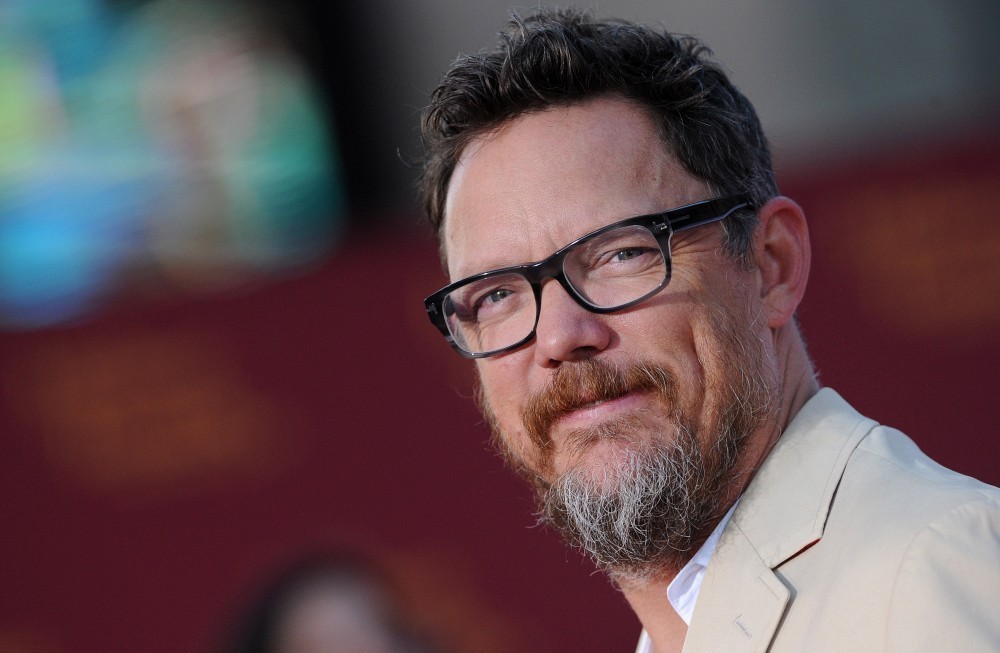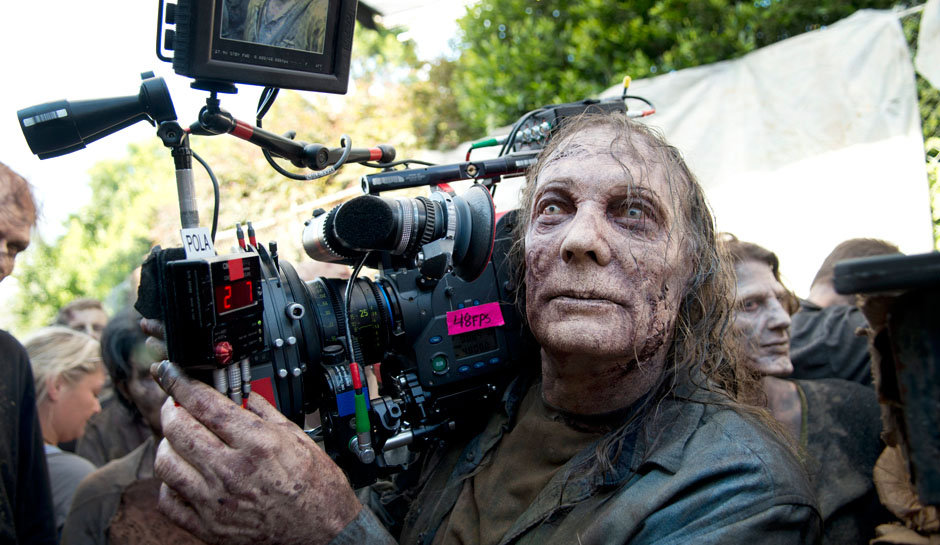Jan 30, 2016 | In Print

(This article originally appeared on Yahoo! Contributor Network on 12/19/11.)
I never thought there would be a sexier James Bond than Sean Connery, and wasn’t sure about the casting for the latest, icy-cool version. But I have to admit, since taking over as the new James Bond, this new guy has given us girls the ultra-suave tough guy to make us swoon. That’s right, you ladies know who I’m talking about: Craig … Daniel Craig.
And has he an early Christmas present for you, returning to the big screen December 21 as the man who works with “The Girl With the Dragon Tattoo” — just another of his growing list of alpha male roles. After years of suffering so-called macho men like Steven Seagal, Chuck Norris, and Jean-Claude Van Damme (who I refer to as “Damme proud, Damme strong, Damme stupid”), we have the sophisticated machismo of Craig. Who knew icy blue could be so smokin’ hot?
Anyway, before I go take a cold shower, let’s look at some great Craig flicks to help hold you over till the big day.
The Mean, the Bad … and the Incredibly Handsome
Craig plays a liar, a thief, and a cheat who plots murder in “Road to Perdition.” He’s a very bad man, but when you look like that, being bad hurts so good. One of his rare smiling moments onscreen is in this one, but it’s the context that truly makes the moment. A young boy asks him why he is always smiling and Craig stoops down to tell him, “’cause it’s all so [expletive] hysterical.”
Bring on the Beef “Cake”
Craig plays a British gangsta drug dealer in “Layer Cake” who romps with Sienna Miller and lays down some heavy life philosophizing in the film’s opening monologue. And yes, you should be listening to what the man has to say — it’s his intelligence that makes him so hot. We love him for his mind … really. His hot body has nothing to do with it, I swear.
Can I Be Your Cowgirl?
First he challenges Connery as the sexiest British secret agent ever, and now he’s trying to move in on Clint Eastwood’s gig as the hottest cowboy ever in “Cowboys & Aliens.” Have you no shame, Mr. Craig? Hold you nothing sacred?
The New and Improved James Bond
You know you gotta watch some Bond action. Craig really made the role of 007 his own with his steely take on the suave man of action. While he may not be as warm and funny as some of the previous versions, it makes it that much more special when he does show a little humor.
Like the scene in “Quantum of Solace” when he is rounded up by super sexy secretary Gemma Arterton. She tries to check them into a less-than-stellar hotel under the cover of being “teachers on sabbatical.” So when Craig refuses to stay in the dump, he marches into the five star accommodations he selects, and informs the front desk in perfect deadpan, “We are teachers on sabbatical. And we have just won the lottery.”
Now, I’ve already told you ladies that some Craig DVDs are a good Christmas gift for the men in your life, as you get a little something for yourself in the deal as well. But boys, it works the other way too — take your lady to see “The Girl With the Dragon Tattoo” when it hits theaters, and let’s just say you may be in for an extra frisky evening after. If you know what I mean.
Jan 29, 2016 | In Print

(This article originally appeared on Yahoo! Contributor Network in May 2012)
While music awards tend to bring out differences in opinion amongst music lovers every year, this year’s Grammy nominations sparked something of a firestorm in one category, and probably not in one you might expect. In fact, probably not a category you even knew was on the ballot.
When the 2011 Grammy nominations were announced for the Americana music category, there was a name in there that for all practical purposes, no one in the established Americana community recognized. Not only did it inspire a heated (and an increasingly nasty) debate, but a new nickname for the artist herself — “Who the [expletive] is Linda Chorney?”
For the artist formerly known simply as Linda Chorney, 2011 wase quite a rollercoaster ride. After 30 years of paying her dues as a musician, she got the nod many artists dream of — the Grammy nomination. Sounds like something to celebrate, right? A real “independent unknown hits the big-time,” feel-good kinda story that inspires everyone.
Not so fast.
To be sure, the initial reaction was amazing for Chorney, as one would expect from her friends, family, and fans. But then something ugly crept into the blogs and forum posts, and not only were people criticizing the music, but getting downright personal. Then accusations of “gaming” the system by networking on the Grammy365 site for votes, and some going so far as calling on Chorney to give up her nomination.
The lynch mob had escalated to the point where the only thing missing was a stake and a lit torch.
“At first, I got an amazing reaction from all of my fans and friends and family — they were just ecstatic. It was like a Cinderella story and just wonderful. I was so excited that so many people supported me to get me in the top five, and people really listened to the music — so I was totally touched by that. Then, it turned and all of a sudden, hearing the other stuff, I was a little surprised, actually. I guess I’m naive.”
The real irony is that such a backlash would come from some of those in a genre that arguably prides itself most on representing the independent spirit in music.
“I actually thought the reaction might be ‘Wow, who is this person who had no backing, who had no label, who had no team, but got so many votes — let’s listen to this music because she must be good.’ That’s kind of what I thought the reaction would be, not ‘Let’s burn her at the stake.’ If this was going on in Salem, I would have been burnt as a witch already.”
Chorney’s great crime in most of her critics’ eyes wasn’t so much about the music, but about networking on the Grammy365 site, simply asking people to listen to her music and consider it. Not only is this common practice for labels, but seriously — is there a musician or artist of any kind who isn’t out trying to network and get people to look at or listen to their work? Somehow that has now been translated into “gaming the system” like it was cheating. And like the voters would be so easily swayed to vote for an album simply because of networking — a rather condescending assertion to Chorney and voters alike. Which isn’t to say there aren’t critics of the music, as well.
“My favorite quote about my music was ‘I listened to her music and I wanted to projectile vomit,'” Chorney laughs. “I thought it was hysterical. I didn’t take it to heart — some are going to like your music and some aren’t.”
In a further twist of irony, Chorney has found herself an outcast in a group who prides itself, and even defines itself, by its outcast status. As Roseanne Cash said, “Americana is where you go when you don’t fit anywhere else.”
So where do you go when you don’t fit with the kids who don’t fit anywhere else? Wherever the hell you want to. And that is exactly what Chorney set out to do with her album “Emotional Jukebox.”
As she will tell you — and as she wrote in the liner notes — this was going to be her last album. The 51-year-old had been trying to catch her break for 30 years, coming close 10 years ago when she landed a record deal and her single “Living Alone” cracked the Top 40 charts at No. 31 in adult contemporary. But then her label went broke after a little incident involving two airplanes and a couple of big towers in New York City.
And so it was back to square one.
But fortunately, Chorney found a benefactor, Jonathan Schneider, aka the “Roc Doc,” who helped her make one more album — and wanted her to be able to make the album she always wanted to make, rather than what a commercial market might demand. Or what being too poor and having to rush through the studio might demand.
“I thought this was going to be my last album … and it was a blast. It was an album of just the love of music and not caring about anything else but making good music, period.”
And many people seem to agree — namely, voters who have forwarded many supportive letters, or, as Chorney calls them, her “peers with ears.” Of course, it isn’t only her peers listening — there are fans out there, too, and their feedback has been far more important than the naysayers.
“The most memorable thing for me or the most fulfilling thing for me is when I touch people and they come up to me and cry and they say to me, ‘Your music, your words, they help me and I know I’m not alone and you say things that I think that I don’t have the [guts] to say.'”
Like her song “Looney Bin,” from her previous album, “Chornography,” which was her own therapy after the end of a relationship.
“I had this tumultuous break-up where my heart was so crushed I wanted to die, and I wrote this song and from the first verse to the end, I healed myself. When people come up to me and tell me they receive some relief from their pain through my songs, there’s nothing more precious than that.”
In addition to giving some of her fans a voice to their troubles and, of course, that whole Grammy-nomination thing, her life as a musician has had a few more highlights. Chorney had the privilege to meet and perform for none other than Nelson Mandela and spent some time in Africa in a village picking up bits and pieces of the language. Her blog has a video of her singing along and thanking her hosts for the porridge in their native tongue, much to the delight of the children. And then she taught them to sing “All You Need Is Love.”
Despite the genre party-poopers trying to rain on her parade, Chorney has weathered tougher times to be sure, where things looked bleak, indeed, for her music career.
“I never wanted to stop singing, but I definitely … I stopped hoping. The hope of reaching my goals to get discovered or get the recognition on a larger level — I kind of gave up on that, and it hurt. So to have gone from kind of giving up and just thinking its never going to happen for me to getting nominated in the same year was a huge thrill. I’ve always had faith in my music, but not in the music business.”
But it seems it’s those few critics who are really stirring the pot that seem to keep getting heard again and again as they campaign so fiercely against Chorney. While her skin may be a bit thickened by her years in the music business, many fans weren’t so unaffected by the personal attacks. That was bothersome.
“I received so many letters saying, ‘This story is so inspiring, it gives me so much hope that I can, at my age, still strive for what I want,’ and it was so touching for me to receive that. But then again, I received a few calls after the smear campaign came out from people who were actually crying and saying, ‘This is so unfair, this is such a happy story — why are they doing this?’ and it breaks my heart for them.”
And when all is said and done, regardless of whether you like her music or not, there’s no denying her late success is an inspiration to us all, not just women or “women of a certain age.” And a lesson that it is never too late, even if you may hit some roadblocks and traffic jams along the way that slow you down. But even those setbacks are all about how you see them — as delays or as taking the slow route and enjoying the journey.
Or as Chorney says, “I took the scenic route to the Grammys.” Indeed.
Jan 24, 2016 | In Print

(Reprint of previously published article removed from original site, CableTV.com.)
Matthew Lillard made a name for himself being the jokester in many of his previous roles, including “Scream,” “The Descendents,” and the cult classic, “SLC Punk.” And while he maintains that he’s not the “comic relief” in FX’s bleak drama, “The Bridge,” he does bring some much-needed levity to the melancholy mood of the show, albeit a very subtle and dark humor. Lillard sat down Tuesday in a conference call to discuss his role on the show as Daniel Frye, a reporter — or former reporter, at this point — for the El Paso Times. His character has a knack for getting himself into dangerous waters, and in fact, Daniel was set to die in Season 1, dodging a car bomb and being thrown off the bridge from whence the show gets its name. But the show’s producers, headed by Elwood Reid, apparently decided to keep him around for a while.
We can only hope he’s here to stay, because not only does his character add some great depth and variety to “The Bridge,” but Lillard proved during the media call that he still has his trademark sense of humor, inviting one reporter to go to the prom with him after a particularly complementary question, and telling another his voice sounded like he had been on a 48-hour binge in Las Vegas. And when the reporter told him that was his normal voice, Lillard replied, “Then you’re a lucky, gravelly son-of-a-bitch.”
The actor also discussed whether his character might make it through this season and that he’s not above doing whatever it takes to get fans on board to keep him on the show, even if it means taking up some unconventional weaponry.
Trust me, if you read on it will make sense.
Diana Price: “The Bridge” is obviously a very heavy dramatic project, but you always seem to provide some kind of comic relief or levity in your roles. Do you seek out those roles, or do you try to inject a little bit of humor at times on the page that’s not already there?
Matthew Lillard: I definitely bring an energy that’s different than other people on the show. I don’t really have a lot of jokes. It’s not like Elwood [Reid] and our incredible writing staff; it’s not like they give me a lot of jokes. I certainly get to say more funny things on the show than anyone else.
Then, I think what I bring is energy and, yes, I generally find opportunities to be funny in really high stakes; “Scream” is a great example of that. When you’re running for your life, and you’re at the end of your rope and the stakes are really high, to be able to make people laugh in that little sweet spot; I like doing that.
I think that it’s a combination. I think that the writers and Elwood have found a great way to use me in the show. I think that Emily and I do a lot of solving the case, but on top of it, we can add a little levity to a world that’s so ripe with drama. Yes, I think it’s a combination of both. I think that they lean into me for that, and I tend to find it on the day.
DP: You were talking about how it was rare for you to get these kinds of dramatic roles. You’ve been known for comedy, and this is a chance for you to mix a little comedy and drama together. Would you like to maybe do more of that; that special mix where you get a little bit of both? We obviously just lost one of the masters of being able to mix those two art forms. Do you think that’s something that you might be interested in doing more of?
ML: Yes. I think that every actor is interested in doing that. There’s not a comedy actor out there who doesn’t want a chance to do drama, and vice versa. As actors, we’re always looking to be pushed and to do the other side of the coin. Look, for me, I would love to do both. I’d love to just continue to work in great things.
Having worked with Alexander Payne in “Descendants,” that kind of tone where you’re laughing one moment and the very next moment you’re crying, speaking specifically when he says goodbye. Judy Greer comes into the room in “Descendants” and she’s going off on his wife. Then, he throws her out and it’s very funny then she leaves and then you’re crying because he’s saying goodbye to his wife. I think that’s real life. I think that comedy and drama live a breath away.
For me, if I’m doing really great work and I can be connected to the words and being “dramatic” and real and then immediately make people laugh, I think that that’s a fantastic place to live. I agree with you, we did lose a master at that. I feel like there are not a lot of people that deal in that nuance.
Not to get too crazy and blither off too long, but film and television has been pushed in extreme directions, having extreme horror and extreme comedy–I don’t think that that reflects real life… Yes, I would love to do those jobs, and I would love to have great jobs; that’s what I’d love to have.
DP: I was just wondering, your character on “The Bridge” has dodged death once, and he looks like he’s getting into a little bit of trouble again on the show getting into some danger. I know you can’t give away any spoilers, but do you think that Daniel has it in him to keep dodging death and stay on the show a little longer?
ML: Look, I will say that there’s an episode that comes up that is mind blowing the things that happen. No character is safe on our show, and I will tell you, I’ve seen a script where I died in Season 1. I got the script and it said Daniel Frye is dead. I’ve seen it and I know how it happens and I know the look on Elwood’s face when he hands you the script. I’m not beyond that, I don’t think anyone on our show is beyond that. Saving probably Diane [Kruger] and Demian [Bechir], I think that everyone is up for grabs, and I think there’s an episode coming up that will surprise people on what happens to characters.
The truth of the matter is, I would love to be a character that they use and use and they dig him deeper and deeper into a pit of despair, and then they have to kill him because there’s no way out. I’d love to be that kind of character; that means that they’re using you in a way that’s full of muscle. As an actor, that’s what you want. I’d love to go out in a blaze of glory if you’ve given me an entire season of work that gets him to a place where you have to kill him; that’s the truth. If you can build a great story around it and it supports Season 3, 4, 5, 6, 7, 8, 9 of the show and you have to kill me, then God bless him. Kill me good.
DP: Just exhaust the character?
ML: Yes. That’s the thing, you dig a character into a hole and you’re like, well, what are you going to do? You can’t come back from that. To write a character that you can’t come back from, to be that character would be really exciting.
DP: Just get the fans behind you; sell t-shirts that say, “If Daniel dies we riot!” and maybe pick up a crossbow.
ML: I would love that. If you could—because I can go right from that to like a zombie show or to the dragon show I’d be into it. If you can give me a crossbow I’d be completely happy with that decision.
See Lillard–sans the crossbow–Wednesday nights at 10 p.m. ET on “The Bridge” on FX.
Jul 30, 2015 | In Print

(This article originally appeared on Livestrong.com on 11/23/11.)
In their quest to lose weight, many people choose fads and shortcuts they think will lead to permanent weight loss. In fact, these things set them up to gain the weight back, and sometimes they may even gain more than they lost. To successfully achieve permanent weight loss, you must get back to the basics of good nutrition and exercise and avoid the common pitfalls that sabotage long-term success.
It doesn’t take a rocket scientist to understand how you lose weight — it’s fairly simple. You must consume fewer calories than you burn doing your activities of daily living and exercise. One pound of weight loss equals 3500 calories, so you must create a 3500-calorie deficit for each pound lost. Remember, your body consumes calories all the time just to stay alive, so it’s not as daunting as it seems. Ideally, combining healthy eating habits and exercise produce a slow and steady weight loss over time, and experts agree that the maximum weight loss to strive for is two pounds weekly.
Read labels at the grocery store and when you prepare food. Carefully look at the nutrition information for the prepared dish and not just the packaged one. For raw foods or meats without labels, consult a resource book for calorie counts or an online calorie estimating tool. Restaurants often have nutritional information available, but many dining out options rack up more calories in one meal than you should consume all day, so eat out with caution. Once you have the information needed, you can compile it through a written journal, or an online tracking site to calculate calories eaten. Many of these also offer tools for estimating calories burned through various forms of exercise to make an estimate of your daily caloric deficit.
Extremely low calories diets backfire by slowing your metabolism into starvation mode, where it conserves energy and calories for survival. As soon as you resume normal eating patterns, the weight loss returns, and you may gain even more weight because of your slowed metabolism. The American College of Sports Medicine recommends at least 1200 calories daily for women and 1800 calories minimum for men, which maximizes weight loss without risking the dangerous side effects from extremely low calorie diets, such as heart arrhythmias, electrolyte imbalances, and dehydration. Other temporary short cuts include diuretic medications that accelerate water loss, but the weight loss returns as soon as fluid levels return to normal.
You must be patient for long-term weight loss. The weight didn’t build up overnight and won’t come off any quicker. Developing consistent diet and exercise habits that you can live with for a lifetime is the key to permanent success. Avoid fad diets that set you up for failure with temporary short cuts. Track your calories and make exercise a priority to stop the yo-yo cycle of weight loss and support a healthier and happier life.





